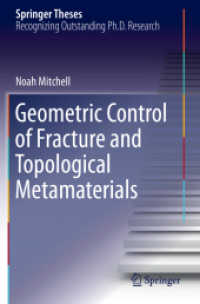- ホーム
- > 洋書
- > 英文書
- > History / World
Full Description
Language is the most essential medium of scientific activity. Many historians, sociologists and science studies scholars have investigated scientific language for this reason, but only few have examined those cases where language itself has become an object of scientific discussion. Over the centuries scientists have sought to control, refine and engineer language for various epistemological, communicative and nationalistic purposes. This book seeks to explore cases in the history of science in which questions or concerns with language have bubbled to the surface in scientific discourse. This opens a window into the particular ways in which scientists have conceived of and construed language as the central medium of their activity across different cultural contexts and places, and the clashes and tensions that have manifested their many attempts to engineer it to both preserve and enrich its function. The subject of language draws out many topics that have mostly been neglected in the history of science, such as the connection between the emergence of national languages and the development of science within national settings, and allows us to connect together historical episodes from many understudied cultural and linguistic venues such as Eastern European and medieval Hebrew science.
Contents
1. Introduction Miles MacLeod, Rocío G. Sumillera, Jan Surman and Ekaterina Smirnova 2. Modern Science and the Spirit of Language, Literature and Philology Matthias Dörries Part 1: Language, Rhetoric and History 3. How Language Became a Tool: The Reconceptualisation of Language and the Empirical Turn in Seventeenth-Century Britain Miles MacLeod 4. The Beginnings of Scientific Terminology in Polish: Kłos's Algorithmus (1538) and Grzepski's Geometria (1566) Jerzy Biniewicz 5. Language and History in the Context of the Société des Observateurs de l'Homme (1799-1804) Martin Herrnstadt and Laurens Schlicht 6. Contested Boundaries: How Scientists Deal with Uncertainty and Ambiguity in Language Priya Venkatesan Hays Part 2: The Creation of Scientific Terminology 7. Reading Astrolabes in Medieval Hebrew Josefina Rodríguez Arribas 8. Opyt in the Social Lexicon of Modernity: The Experience/Experiment Dichotomy Ekaterina Smirnova 9. Linguistic Precision and Scientific Accuracy: Searching for the Proper Name of "Oxygen" in French, Danish and Polish Jan Surman 10. Mathematical Machines: Automating Thinking? Helena Durnová Part 3: Imagining Universal Languages 11. 17th-Century British Projects for a Universal Language and Their Reception in the Augustan Age: The Cases of John Wilkins and Jonathan Swift Rocío G. Sumillera 12. One Second Language for Mankind: The Rise and Decline of the World Auxiliary Language Movement in the Belle Époque Markus Krajewski 13. Impacts of a Global Language on Science: Are There Disadvantages? Scott L. Montgomery








